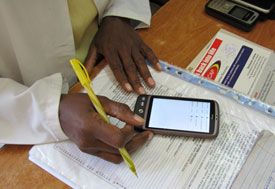Fogarty launches strategic plan to meet new global health needs
March / April 2014 | Volume 13, Issue 2
Global health research and training efforts should focus on combatting the growing epidemic of noncommunicable diseases (NCDs), better incorporating information technology into research projects and training tools, and more effectively converting scientific discoveries into practice in low-resource settings. These are among the goals detailed in Fogarty's new strategic plan, developed with input from the global health research community and in consultation with its many partners and grantees.
As research discoveries and aid efforts have reduced the death toll from HIV/AIDS, aging populations in the developing world are increasingly suffering from NCDs - heart disease, cancer, diabetes, mental illness and others. "It is critical that we leverage the HIV research and care delivery platform to build the capacity needed to stem the tide of these new disease epidemics," said Dr. Roger I. Glass, who leads Fogarty and also serves as the NIH Associate Director for Global Health Research. "We must focus our attention on these pressing problems, which also plague us at home in the U.S., and discover new ways to prevent and treat them," Glass suggested. "Today, global health and local health are becoming one and the same, and research anywhere can help people everywhere."

Photo by Curt Carnemark/World Bank
One of Fogarty's new goals is to
focus on research and training to
address the rising tide of chronic,
noncommunicable diseases in
low-resource settings.
Fogarty plans to reinvigorate its efforts to train more developing-country scientists in these new areas of global health, where the field is moving and where the most interesting discoveries are yet to be made, Glass said.
"Our concept of investing in training outstanding young investigators, both U.S. and foreign, and linking them early in their careers in research partnerships between their institutions has been a winning strategy that has had a major impact on the research enterprise for global engagement." Fogarty trainees have participated in research studies that have resulted in key discoveries to improve care and reduce the spread of HIV/AIDS. These include determining that populations in low-resource settings can adhere to complicated treatment regimens and that antiretroviral drugs and circumcision are effective at preventing disease transmission.
To capitalize on the upsurge of interest in global health on U.S. campuses, Fogarty intends to boost efforts to recruit investigators with diverse specialties including cardiology, oncology, bioengineering, neurology and mental health, and other topics that in the past were not considered in the realm of global health. "In order to solve the increasingly complex global health problems, we must also transform our programs to spur innovative solutions created by multidisciplinary teams with skills not traditionally related to health, such as engineering, business, economics and law," Glass observed.
Another priority under the new plan is to intensify efforts to incorporate information and communication technology (ICT) into the Center's research and training programs. "Our grantees and partners are producing novel teaching tools and electronic resources that make knowledge about disease and prevention freely available to all," Glass noted.

Photo courtesy of Dr. Marc Mitchell
Fogarty's new strategic plan stresses the
importance of intensifying efforts to incorporate
information communication technology into its
research and training programs.
The Center recently requested proposals to develop innovative educational approaches that would enhance research capacity in low- and middle-income countries (LMICs). "E-learning is a powerful way to enable physicians and medical personnel at all levels to gain access to the ever-expanding and changing knowledge base that can keep them up-to-date throughout their careers," Glass explained. "Now that more people in LMICs have cellphones than toilets, we see growing opportunities to adapt mobile applications to improve access to populations for research and provision of care." It will be critical that these projects are carefully monitored and evaluated to ensure they are effectively integrated into the practice of medicine, public health and research, he said.
Implementation science remains a high priority for the Center under the new plan, so that proven interventions are quickly adapted for use in low-resource settings and are actually delivered there and scaled up effectively. Increased efforts are needed to catalyze partnerships and improve communication between the scientific community and program implementers and decision-makers, so that science informs program and policy, and research is responsive to program and policy needs, according to the plan.
Fogarty's new strategic vision is intended to advance the global health research agenda by building on past and current Fogarty investments and successes in a way that responds to the changed landscape in global health. Specific goals and priorities are outlined in five main areas: building research capacity to meet current and future global health challenges; stimulating innovation in the development and evaluation of technologies to address global health problems; supporting research and research training in implementation science; advancing research on prevention and control of communicable and noncommunicable diseases and disability; and building partnerships to advance global health research and research capacity.
"By taking science to where the problems are, and by supporting research and research training in areas where the burden of disease is greatest, Fogarty investments will continue to build the health research workforce of the future while bringing scientific inquiry to bear on some of the world's most complex health problems affecting populations both at home and abroad," Glass concluded.
More Information
To view Adobe PDF files,
download current, free accessible plug-ins from Adobe's website.